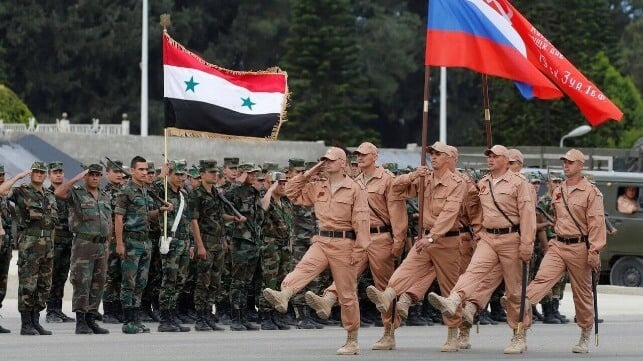As Syrian Rebels Advance, Russian Navy Leaves Port of Tartus

For the sailors of the Russian Navy, the choices for available homeports tend to be cold and grim, unless you wish to serve under fire in the Black Sea Fleet or the Caspian Flotilla. Since the Ukraine war started, these are no longer the attractive postings they may have been in the past. The best remaining alternative to the cold winters of the Northern Fleet’s Murmansk and the Pacific Fleet’s Vladivostok may be service with the Mediterranean Flotilla, based in Tartus on the Syrian coast, where the Russian Navy has had a presence since 1971.
Although it has been subject to occasional terrorist attacks since the Syrian civil war began in 2014, Tartus has been a largely peaceful albeit shabby seaside town, deep in an area with a majority Alawi Shi’ite population from which President Bashar Al Assad draws his support. Tartus has a secular and liberal atmosphere, and for 50 years the Russians have made themselves at home, enjoying what the port city has to offer - safely at some distance from the war their colleagues are fighting against Ukraine.
The successful offensive mounted by Hayat Tahrir al-Sham (HTS), the terrorist organization which used to be known as the Al-Nusra Front, has changed all this. HTS so far has captured Aleppo to the northeast and Hama 50 miles to the east, but it would be a stretch to imagine HTS could fight their way over the mountains defended by local Alawi militia to get to Tartus.
However, they have reached close enough to apparently have provoked the evacuation of the Russian flotilla from Tartus on December 2. The flotilla, consisting of Kilo Class submarine Novorossiysk (B261), Gorshkov Class cruisers Admiral Golovko (461) and Admiral Gorshkov (454), the Krivak Class Admiral Grigorovich (F745), and two oilers, Vyazma and Velnya, had most unusually all left by nightfall and their berths were empty when observed by satellite on December 3. Russian media subsequently suggested that the ships were conducting a live firing exercise in the Eastern Mediterranean. Cloud cover over the Eastern Mediterranean in the following days has - for the moment - hidden their exact whereabouts.
ISI reveals: Disappearance of most of the #Russian #Naval Forces from #Tartus Port, #Syria.
— ImageSat Intl. (@ImageSatIntl) April 11, 2018
Those missing naval vessels have now been deployed at sea due to possible near-future #strikes. Only one #kilo class submarine remained.#russiannavy #Syriastrikes #foxnews #kilo pic.twitter.com/guRA9w0qqt
The Russian Navy makes frequent port calls in the Mediterranean, and vessels from the Mediterranean Flotilla have in the past three months been seen in Bizerte (Tunisia), Algiers, Tobruk (Libya) and Alexandria (Egypt). But these have been port visits, and the Russians do not enjoy the luxury of logistics, ship repair or weapons storage facilities at these locations. Nor can the flotilla rejoin the Black Sea Fleet, as Turkey has exercised its right under the Montreux Convention to bar passage of warships through the Bosphporus.
Should they decide to relocate within the Mediterranean, the most likely haven is Tobruk, controlled by Libyan warlord Field Marshall Khalifa Haftar. The Russians have recently been renovating airbases for their own use in his fiefdom at Brak Al Shatti, Al Jufra, Al Qardabiyah and Al Khadim. The Field Marshall - a US citizen and former resident of Langley, Virginia - might not be considered a reliable long-tern ally.

that matters most
Get the latest maritime news delivered to your inbox daily.
Tartus has proven to be a valuable Russian asset. The Russian presence in the port has facilitated unchallengeable arms shipments in sovereign warships not only to Syria, but also to Iran’s Axis of Resistance allies across the Levant. Recently-manufactured Russian weapons have been found in Hezbollah arsenals discovered by Israeli forces in southern Lebanon. Russian ships from the Flotilla also make frequent influence port calls to bolster relations with countries friendly to Russia in the Mediterranean.
But in the short term, a Russian presence is likely to be of most value standing off the Syrian coastline, poised to support Russian land and air assets still in Syria - and maybe even to assist with an evacuation either of Russians, or even of Russia’s Syrian allies, should the rebels advance further towards Damascus or provoke a coup. Otherwise, the flotilla faces a long trip home to the frozen north.
